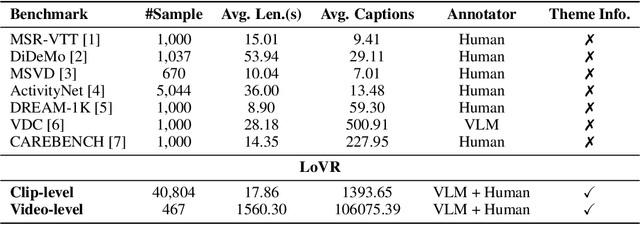Zhaoyang Han
DataFlow: An LLM-Driven Framework for Unified Data Preparation and Workflow Automation in the Era of Data-Centric AI
Dec 18, 2025Abstract:The rapidly growing demand for high-quality data in Large Language Models (LLMs) has intensified the need for scalable, reliable, and semantically rich data preparation pipelines. However, current practices remain dominated by ad-hoc scripts and loosely specified workflows, which lack principled abstractions, hinder reproducibility, and offer limited support for model-in-the-loop data generation. To address these challenges, we present DataFlow, a unified and extensible LLM-driven data preparation framework. DataFlow is designed with system-level abstractions that enable modular, reusable, and composable data transformations, and provides a PyTorch-style pipeline construction API for building debuggable and optimizable dataflows. The framework consists of nearly 200 reusable operators and six domain-general pipelines spanning text, mathematical reasoning, code, Text-to-SQL, agentic RAG, and large-scale knowledge extraction. To further improve usability, we introduce DataFlow-Agent, which automatically translates natural-language specifications into executable pipelines via operator synthesis, pipeline planning, and iterative verification. Across six representative use cases, DataFlow consistently improves downstream LLM performance. Our math, code, and text pipelines outperform curated human datasets and specialized synthetic baselines, achieving up to +3\% execution accuracy in Text-to-SQL over SynSQL, +7\% average improvements on code benchmarks, and 1--3 point gains on MATH, GSM8K, and AIME. Moreover, a unified 10K-sample dataset produced by DataFlow enables base models to surpass counterparts trained on 1M Infinity-Instruct data. These results demonstrate that DataFlow provides a practical and high-performance substrate for reliable, reproducible, and scalable LLM data preparation, and establishes a system-level foundation for future data-centric AI development.
LoVR: A Benchmark for Long Video Retrieval in Multimodal Contexts
May 20, 2025



Abstract:Long videos contain a vast amount of information, making video-text retrieval an essential and challenging task in multimodal learning. However, existing benchmarks suffer from limited video duration, low-quality captions, and coarse annotation granularity, which hinder the evaluation of advanced video-text retrieval methods. To address these limitations, we introduce LoVR, a benchmark specifically designed for long video-text retrieval. LoVR contains 467 long videos and over 40,804 fine-grained clips with high-quality captions. To overcome the issue of poor machine-generated annotations, we propose an efficient caption generation framework that integrates VLM automatic generation, caption quality scoring, and dynamic refinement. This pipeline improves annotation accuracy while maintaining scalability. Furthermore, we introduce a semantic fusion method to generate coherent full-video captions without losing important contextual information. Our benchmark introduces longer videos, more detailed captions, and a larger-scale dataset, presenting new challenges for video understanding and retrieval. Extensive experiments on various advanced embedding models demonstrate that LoVR is a challenging benchmark, revealing the limitations of current approaches and providing valuable insights for future research. We release the code and dataset link at https://github.com/TechNomad-ds/LoVR-benchmark
EdgeQAT: Entropy and Distribution Guided Quantization-Aware Training for the Acceleration of Lightweight LLMs on the Edge
Feb 16, 2024



Abstract:Despite the remarkable strides of Large Language Models (LLMs) in various fields, the wide applications of LLMs on edge devices are limited due to their massive parameters and computations. To address this, quantization is commonly adopted to generate lightweight LLMs with efficient computations and fast inference. However, Post-Training Quantization (PTQ) methods dramatically degrade in quality when quantizing weights, activations, and KV cache together to below 8 bits. Besides, many Quantization-Aware Training (QAT) works quantize model weights, leaving the activations untouched, which do not fully exploit the potential of quantization for inference acceleration on the edge. In this paper, we propose EdgeQAT, the Entropy and Distribution Guided QAT for the optimization of lightweight LLMs to achieve inference acceleration on Edge devices. We first identify that the performance drop of quantization primarily stems from the information distortion in quantized attention maps, demonstrated by the different distributions in quantized query and key of the self-attention mechanism. Then, the entropy and distribution guided QAT is proposed to mitigate the information distortion. Moreover, we design a token importance-aware adaptive method to dynamically quantize the tokens with different bit widths for further optimization and acceleration. Our extensive experiments verify the substantial improvements with our framework across various datasets. Furthermore, we achieve an on-device speedup of up to 2.37x compared with its FP16 counterparts across multiple edge devices, signaling a groundbreaking advancement.
Punctuation Matters! Stealthy Backdoor Attack for Language Models
Dec 26, 2023Abstract:Recent studies have pointed out that natural language processing (NLP) models are vulnerable to backdoor attacks. A backdoored model produces normal outputs on the clean samples while performing improperly on the texts with triggers that the adversary injects. However, previous studies on textual backdoor attack pay little attention to stealthiness. Moreover, some attack methods even cause grammatical issues or change the semantic meaning of the original texts. Therefore, they can easily be detected by humans or defense systems. In this paper, we propose a novel stealthy backdoor attack method against textual models, which is called \textbf{PuncAttack}. It leverages combinations of punctuation marks as the trigger and chooses proper locations strategically to replace them. Through extensive experiments, we demonstrate that the proposed method can effectively compromise multiple models in various tasks. Meanwhile, we conduct automatic evaluation and human inspection, which indicate the proposed method possesses good performance of stealthiness without bringing grammatical issues and altering the meaning of sentences.
A Survey on Backdoor Attack and Defense in Natural Language Processing
Nov 22, 2022



Abstract:Deep learning is becoming increasingly popular in real-life applications, especially in natural language processing (NLP). Users often choose training outsourcing or adopt third-party data and models due to data and computation resources being limited. In such a situation, training data and models are exposed to the public. As a result, attackers can manipulate the training process to inject some triggers into the model, which is called backdoor attack. Backdoor attack is quite stealthy and difficult to be detected because it has little inferior influence on the model's performance for the clean samples. To get a precise grasp and understanding of this problem, in this paper, we conduct a comprehensive review of backdoor attacks and defenses in the field of NLP. Besides, we summarize benchmark datasets and point out the open issues to design credible systems to defend against backdoor attacks.
PromptAttack: Prompt-based Attack for Language Models via Gradient Search
Sep 05, 2022



Abstract:As the pre-trained language models (PLMs) continue to grow, so do the hardware and data requirements for fine-tuning PLMs. Therefore, the researchers have come up with a lighter method called \textit{Prompt Learning}. However, during the investigations, we observe that the prompt learning methods are vulnerable and can easily be attacked by some illegally constructed prompts, resulting in classification errors, and serious security problems for PLMs. Most of the current research ignores the security issue of prompt-based methods. Therefore, in this paper, we propose a malicious prompt template construction method (\textbf{PromptAttack}) to probe the security performance of PLMs. Several unfriendly template construction approaches are investigated to guide the model to misclassify the task. Extensive experiments on three datasets and three PLMs prove the effectiveness of our proposed approach PromptAttack. We also conduct experiments to verify that our method is applicable in few-shot scenarios.
 Add to Chrome
Add to Chrome Add to Firefox
Add to Firefox Add to Edge
Add to Edge